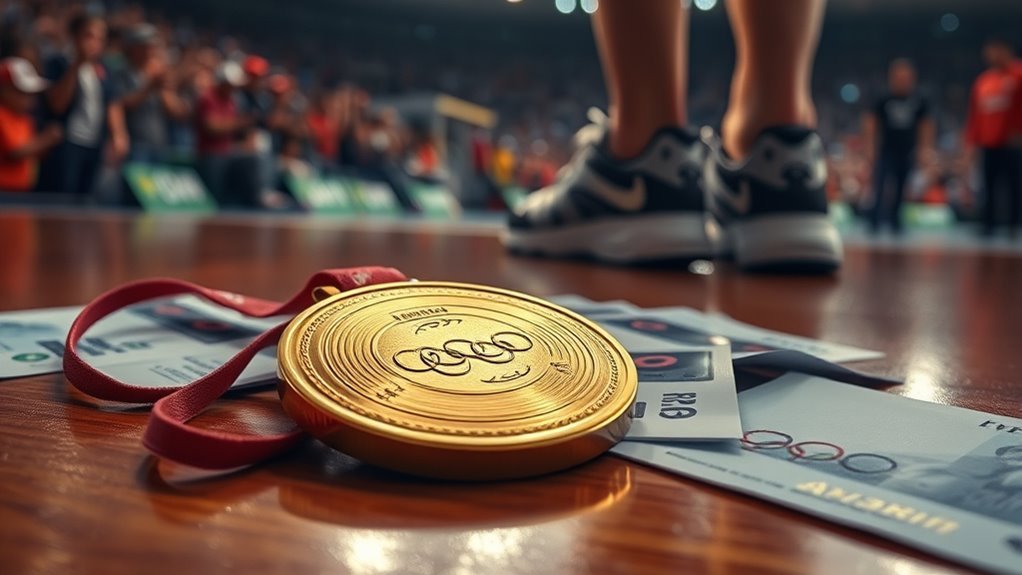Athletes get paid in various ways. You’ll find they earn salaries from their teams based on contracts and performance. Endorsements and sponsorships also play a big role in boosting income, thanks to their fame. Many athletes receive prize money from competitions and performance bonuses for excelling. Marketability can greatly enhance their earning potential, too. There’s a lot more to discover about how these earnings break down across different sports and levels of competition.
The Basics of Athlete Salaries
When you think about athlete salaries, it’s essential to recognize that they vary widely based on factors like the sport, the league, and individual performance. Salary structures are often determined by the revenue generated by the sport, with some leagues operating under strict caps while others allow for more freedom. Contract negotiations play a significant role in shaping what an athlete earns; skilled agents can secure better deals, leading to lucrative contracts. Additionally, performance metrics and marketability can greatly influence an athlete’s paycheck. You’ll find that top athletes in popular sports can command staggering salaries, while those in less mainstream sports may struggle to earn a living. Understanding these basics helps you appreciate the complexities behind athlete compensation.
Endorsements and Sponsorships
Athlete salaries are just one aspect of their overall earnings, with endorsements and sponsorships often playing a significant role in boosting their income. Endorsement deals and sponsorship agreements can lead to substantial financial rewards, allowing athletes to leverage their fame and personal brand. These partnerships not only provide cash but also products and services that enhance their lifestyle.
| Athlete | Brand | Earnings from Deals |
|---|---|---|
| LeBron James | Nike | $30 million |
| Serena Williams | Wilson | $20 million |
| Tom Brady | Under Armour | $10 million |
| Lionel Messi | Adidas | $25 million |
| Naomi Osaka | Nike | $8 million |
These lucrative opportunities often give athletes the freedom to pursue their passions beyond the field.
Prize Money and Performance Bonuses
While endorsements often grab the spotlight, prize money and performance bonuses are vital components of an athlete’s income. Depending on the sport, prize distribution can vary greatly, with some competitions offering substantial amounts for top performers. You might be surprised to learn that many athletes rely on these earnings to supplement their financial stability.
Bonus structures also play an important role, rewarding athletes for achieving specific milestones or outstanding performances. In sports like boxing or MMA, these bonuses can be life-changing, boosting an athlete’s income considerably. Ultimately, understanding how prize money and performance bonuses work gives you insight into the financial landscape athletes navigate, empowering you to appreciate the hard work and dedication behind their success.
The Impact of Marketability and Brand Appeal
Marketability and brand appeal considerably influence an athlete’s earning potential, as they can attract lucrative endorsement deals and sponsorship opportunities. If you want to maximize your earnings, consider these factors:
- Market Trends: Stay ahead by understanding what brands want. Align your image with current trends to enhance your appeal.
- Fan Engagement: Building a strong connection with fans can elevate your marketability. Active social media presence can create loyal followers who attract brands.
- Unique Personality: Embrace what makes you different. Authenticity resonates with fans and brands alike, leading to more opportunities.
Earnings Across Different Levels of Competition
Although earnings can vary considerably, understanding the financial landscape across different levels of competition is essential for aspiring athletes. Amateur athletes often compete without financial rewards, relying on passion and dedication. In collegiate sports, things start to shift; while athletes can earn scholarships, their actual income remains limited. However, with recent changes in rules, athletes can now profit from endorsements and sponsorships, providing a taste of financial freedom. At the professional level, earnings skyrocket, with contracts, bonuses, and merchandise sales contributing to substantial incomes. The path from amateur to professional isn’t easy, but by recognizing these differences, you can better navigate your journey and seize opportunities that align with your goals and aspirations.
Frequently Asked Questions
How Do Athletes Manage Their Finances and Taxes?
Athletes manage their finances and taxes through strategic financial planning and effective tax strategies. You’ll want to work with financial advisors who understand your unique situation and can help you create a budget, invest wisely, and save for the future. Utilizing tax strategies can minimize your liabilities, ensuring you keep more of what you earn. By staying informed and proactive, you can achieve the financial freedom you desire and secure your financial future.
What Role Do Agents Play in Athlete Salaries?
Agents play an essential role in athlete salaries by handling contract negotiations and securing endorsement deals. They know the industry inside out and can help you maximize your earnings. With their expertise, you can focus on your performance while they negotiate the best terms. They also help you navigate the complexities of contracts, ensuring you get what you deserve. Trusting an agent can free you up to truly excel in your sport.
Can Amateur Athletes Earn Money Legally?
Yes, amateur athletes can earn money legally now. With the recent changes in rules, you’ve got a chance to explore sponsorship deals and endorsement opportunities. This means you can capitalize on your talents without compromising your amateur status. It’s empowering to see athletes like you gaining financial freedom while pursuing your passion. So, take advantage of these new avenues and let your skills shine both on and off the field!
How Do Injuries Affect an Athlete’s Earnings?
Injuries can greatly impact your earnings as an athlete. While some might argue that contracts offer security, the reality is that injuries can lead to renegotiated contracts or even early retirements. You might rely on injury insurance to cushion the financial blow, but it often doesn’t cover everything. When you’re sidelined, sponsors may pull back, and your marketability takes a hit, making it essential to prioritize your health and recovery.
What Happens to an Athlete’s Earnings After Retirement?
After retirement, an athlete’s earnings can shift markedly. You might rely on post-retirement income from endorsements, speaking engagements, or coaching. It’s essential to adopt smart investment strategies during your playing career to guarantee financial stability later on. Diversifying your investments can help create passive income streams, giving you the freedom to pursue your passions without financial stress. Staying proactive about your finances can lead to a fulfilling life beyond the game.




